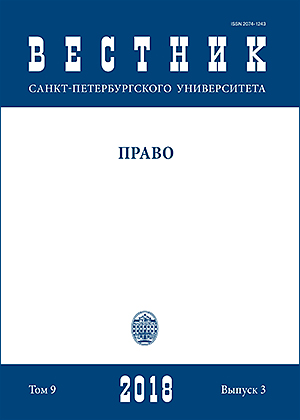Координационная юридическая технология в Соединенном Королевстве (на примере отдельных регионов)
DOI:
https://doi.org/10.21638/11701/spbu14.2018.301Аннотация
В статье рассматриваются проблемы закрепления координационных норм в законодательстве Соединенного Королевства на примере Шотландии. Материал представляет интерес, так как в нем представлен позитивный зарубежный опыт, а также намечены возможности использования этого опыта в России; именно отсутствие должной координации в отечественном праве делает работу актуальной. Цель и задачи исследования – установить уровень координационной юридической технологии в Шотландии и определить то, что применимо в российском праве. По мнению автора, в законодательстве Шотландии содержатся координационные нормы и элементы координационной доктрины, которые могут быть интересными и для отечественного права. В частности, зарубежный опыт будет полезен в части применения особенностей зарубежной доктрины координации в отношении судов и судей. Целесообразно использовать подход западного законодателя к вопросам конструирования правил о юридической ответственности за неисполнение координационных норм или решений. Это потребует обязательного описания отдельных признаков, входящих в предмет доказывания по данным делам, в том числе с позиций их процессуальной фиксации. Вслед за западными юристами нужно прийти к пониманию того, что нормативное регулирование вопросов координации на общенациональном уровне не должно оканчиваться лишь принятием общего закона о координации и соответствующими изменениями в иных правовых актах. Объективно нужны отраслевые законы о координации, где общие координационные нормы будут конкретизированы. Можно поучиться тому, как западные юристы обозначают права и обязанности субъектов и участников координационного процесса в целом и его различных стадий. На основе имеющихся примеров стоит предусмотреть гарантии для реализации прав. Скорее всего, потребуется и описание обязательных стадий координационного процесса, наиболее распространенных форм координационного взаимодействия, средств и способов координационной деятельности, способов фиксации результатов координационной деятельности, способов и параметров их оценки.
Ключевые слова:
координация, конституционные нормы, международное сотрудничество, информация, согласование, полномочия
Скачивания
Библиографические ссылки
Загрузки
Опубликован
Как цитировать
Выпуск
Раздел
Лицензия
Статьи журнала «Вестник Санкт-Петербургского университета. Право» находятся в открытом доступе и распространяются в соответствии с условиями Лицензионного Договора с Санкт-Петербургским государственным университетом, который бесплатно предоставляет авторам неограниченное распространение и самостоятельное архивирование.






